John
Buchan wrote The
Thirty-Nine Steps
after running out of lite
reading to cheer him up one winter when he was sick. He
described it to a friend as "that elemental type of tale which
Americans call the 'dime novel' and which we know as the
'shocker'—the romance where the incidents defy the probabilities,
and march just inside the borders of the possible."
After
an illustrious career that included writing more than 100 published
books and serving as a diplomat and politician, eventually winning a
peerage as Lord Tweedsmuir and appointment as Governor General of
Canada, he is best known today for that little spy-novel, which The
Guardian
listed in 2014 as one of the 100 best novels in the English language.
That
last, about
the language,
would
have sent one of my eyebrows skyward, were I capable of such a
maneuver,
because the novel's protagonist, Richard Hannay, spends much of this
short novel running
and hiding in
the wilds of Scotland from police, who believe he impaled his
roommate with a dagger through
the heart to
the floor back in London, and from
German
spies bent presumably on doing the
same to
him.
Here’s
what I mean about the language barrier:
“'And that's a' I get,' he
moaned. 'A heid better than hell fire, and twae een lookin' different
ways for the Sabbath.'
“'What did it?' I asked.
“'A
drink they ca' brandy. Bein' a teetotaller I keepit off the whisky,
but I was nip-nippin' a' day at this brandy, and I doubt I'll no be
weel for a fortnicht.' His voice died away into a splutter, and sleep
once more laid its heavy hand on him.”
Several
films have been made of The
Thirty-Nine Steps,
the first by Alfred Hitchcock in 1935. I believe I watched part of
one
on our old B&W TV. If
any of them had kept this Scottish brogue in the dialogue, I would
have needed subtitles to know what in hell was being said. All
I remember is seeing some male
character
pacing around outdoors
by some buildings,
counting his steps, while dark, dramatic music throbbed in the
background (or maybe the foreground). I’ve
wondered ever since what the story was all about.
The
Thirty-Nine Steps
opens just
prior to the first world war with
Hannay recently
back from an engineering gig in South
Africa,
bored out of his mind in London. “The weather made me liverish, the
talk of the ordinary Englishman made me sick, I couldn't get enough
exercise, and the amusements of London seemed as flat as soda- water
that has been standing in the sun...
“Here
was I, thirty-seven years old, sound in mind
and limb, with enough money to have a good time, yawning my head off
all day. I had just about settled to clear out and get back to the
veld, for I was the best bored man in the United Kingdom.”
Then
along comes Franklin P. Scudder to liven things up. Covering
the war buildup for a Chicago newspaper, Scudder has stumbled upon a
sinister plot involving German agents, who then begin following him.
Fearing for his life, he feigns his own death and persuades Hannay to
let him hide in Hannay’s flat while he plans to shake the tailing
Germans.
He tells Hannay what he’s found, stirring Hannay from his boredom.
But, of course, the adage “be careful what you wish for” thickens
the plot—deliciously.
Hannay
returns home from dinner to find Scudder in the aforementioned
impaled condition, and Hannay knows the target’s now painted on
him. Figuring the best place to hide is in the wilds of his native
Scotland, off he goes, about thirty-nine steps ahead of the police,
who believe he killed Scudder, and, as we know, of
the
bad guys mit der terrifying Cherman accents, ja. (I didn’t count
the steps between the pursuers and the pursued, in case you were
wondering. Just my corny little joke.)
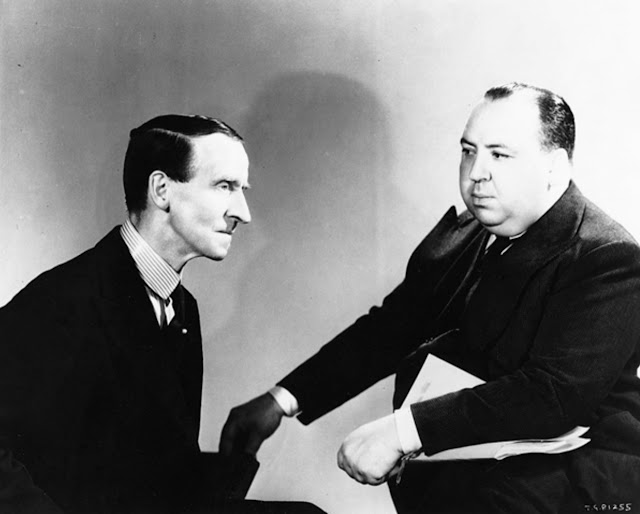 |
John
Buchan and director Alfred
Hitchcock, likely taken at the London premiere
of The
39 Steps
|
The
chase. Ah, the glorious chase, with narrow escapes, harrowing
suspense, and perhaps a tad too many incredible coincidences of the
sort “where
the incidents defy the probabilities, and march just inside the
borders of the possible."
I
must say at times they
stray a tad over those borders, and yet, like watching Indiana Jones
outrun the giant rolling boulder or James Bond crawl through searing
heat ducts to escape Dr. No’s evil lair, my imagined adrenalin was
pumping with great vicarious enthusiasm for Richard Hannay.
It
didn’t hurt that Hannay himself tells us he’s aware of the
implausibility of some of these happenstances:
“So
far I had been miraculously lucky. The milkman, the literary
innkeeper, Sir Harry, the roadman, and the idiotic Marmie, were all
pieces of undeserved good fortune. Somehow the first success gave me
a feeling that I was going to pull the thing through.”
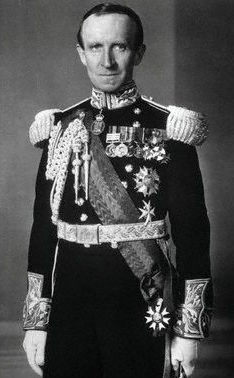 |
| Lord Tweedsmuir |
And
then, fleeing spies on the ground and in the air, he comes upon a
remote cottage occupied by an old man who hid Hannay while sending
his pursuers away.
“Once again I had found
an unexpected sanctuary. All
the same I was not comfortable. There was something about the old
gentleman which puzzled and rather terrified me. He had been too easy
and ready, almost as if he had expected me. And his eyes had been
horribly intelligent.”
Hannay
recalls Scudder telling him about “a man that lisped in his speech,
and he described very particularly somebody that he never referred to
without a shudder—an old man with a young voice who could hood his
eyes like a hawk.”
“As
he spoke,” Hannay says of the old man in the cottage, “his
eyelids seemed to tremble and to fall a little over his keen grey
eyes. In a flash the phrase of Scudder's came back to me, when he had
described the man he most dreaded in the world…
“Then
I saw that I had walked straight into the enemy's headquarters.”
So
what of the thirty-nine steps? Don’t expect to find the answer
until nearly the end. Hannay has no idea, and he’d be the one to
shed some light on the mystery. All he does know is simply one
bracketed phrase that appears half a dozen times in Scudder’s
notebook:
“’Thirty-nine steps,’ was the phrase; and at its last time of
use it ran—‘Thirty-nine steps, I counted them—high tide 10.17
p.m.'
“I
could make nothing of that.”

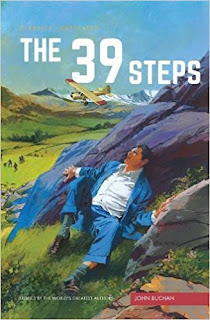
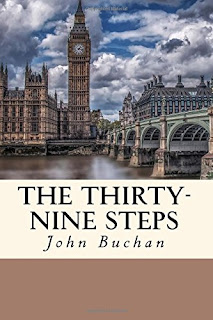
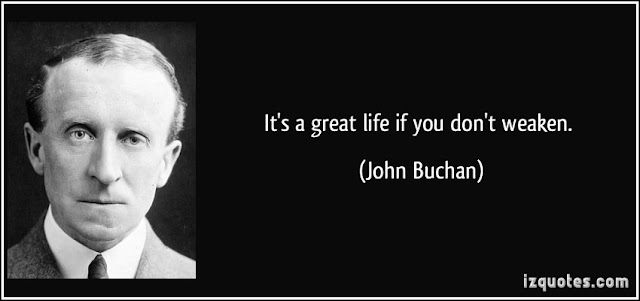
I'm glad you gave Buchan a try, Mathew. There are five books in the Hannay 'series' in all. MR. STANDFAST and GREENMANTLE are especially rousing adventures. The last book in the series is ISLAND OF SHEEP - wrote about it last week. I'm a HUGE Buchan fan-girl and always ready to praise him with enthusiasm. :)
ReplyDeleteI thought it was you, Yvette, but I didn't have Internet access when I wrote my review. I downloaded a three-book collection on my Kindle app, including Mr. Standfast and Greenmantle. I'll be reading them soon.
DeleteI read this for the first time a couple of years ago, and enjoyed it. Now I need to get to other books in the series. I had forgotten about the Scottish dialect in the book.
ReplyDeleteI'm a little put off by the dialect. An occasional word to suggest a tone is all I need, but I find it tiresome when it goes on and on...
Delete